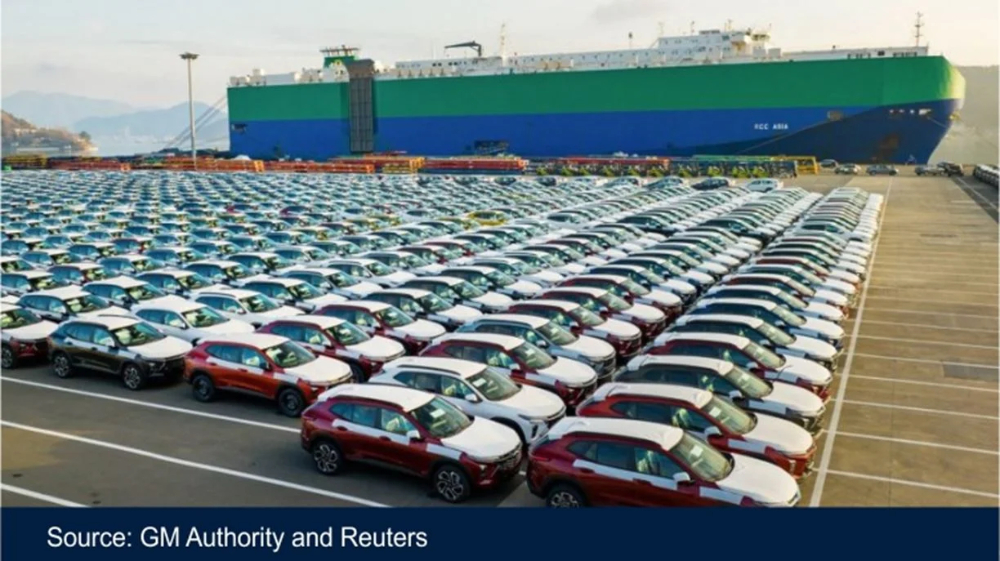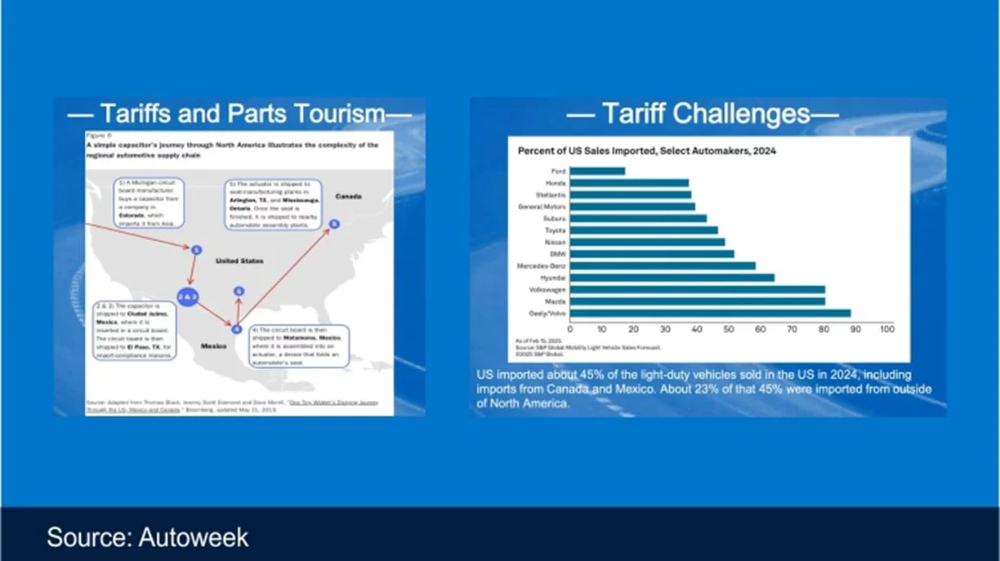- in Canada
- within International Law, Environment and Energy and Natural Resources topic(s)
- with Senior Company Executives, HR and Finance and Tax Executives
- in Canada
- with readers working within the Accounting & Consultancy, Business & Consumer Services and Environment & Waste Management industries

As U.S. President Donald Trump slaps tariffs on most of the world, the effects could lead to nearly 2 million fewer auto sales in the United States during 2025, according to the auto advisory firm Telemetry. As Reuters reports, the forecast projects that 1.8 million fewer auto sales may take place in the U.S. this year as a result of the tariffs, with the potential for 7 million fewer sales in Canada and the United States between now and 2035.
With a 25 percent tariff on complete vehicles and vehicle components imported into the United States now in place, plants are already pausing production in Canada and Mexico. Some layoffs are also happening in the U.S. as workers who produced parts to be sent to the neighboring countries for final assembly into vehicles are sent home by various automakers. With about 75 percent of Buick vehicles currently being built outside U.S. borders the brand itself could be at risk of extinction. Even if this worst-case scenario doesn't happen, the Tri-Shield could see its optimistic growth predictions cut back – perhaps drastically – by the long-term effects of the tariffs.
Telemetry's insights VP Sam Abuelsamid commented on several aspects of the scenario that sees a sharp cutback in the number of U.S. auto sales both in 2025 and in the longer term. Abuelsamid said "vehicle affordability is already a major issue for consumers" and that "with sales going down, you're going to have layoffs." While President Trump has touted the tariffs as a way to return manufacturing to the United States – an opinion echoed by UAW president Shawn Fain – Abuelsamid remains dubious. He pointed out that "even to the degree that some production shifts to the U.S., it's not going to be enough to offset the lost employment from higher costs and lower sales."
U.S. auto sales were consistently in the 17-million range prior to COVID-19. In the year of the pandemic, they dipped to 14.6 million sales, before climbing back to 16 million in 2024. A 1.8-million unit drop such as that predicted by Telemetry could see 2025 sales as low as 14.2 million vehicles, even worse than the initial year of the COVID pandemic.
Source: GM Authority and Reuters
Automakers may restrict gas, hybrid car sales if EV rule holds
The California New Car Dealers Association's report on car sales in the year's first quarter earlier comments by Toyota that the mandate is "impossible" to meet: ZEV market share fell from 22% in 2024, to 20.8% in the first quarter of 2025. "If CARB doesn't pause or adjust the ACCII mandate, we are concerned automakers will restrict shipments of traditional hybrids and affordable gas-powered models to avoid massive fines," said CNCDA President Brian Maas to The Center Square. "This is occurring in California's heavy-duty truck marketplace, which has been devastated by similar CARB rules that took effect in January 2024."
Source: The Center Square
Stellantis pauses production at Detroit plants making grand Cherokee
Stellantis NV's Detroit Assembly Complex plants that build Jeep Grand Cherokee and Dodge Durango SUVs will pause production next week, the latest of several plant cutbacks made by the automaker in recent weeks. The Mack and Jefferson North facilities in east Detroit will halt production for the week of April 28, with Mack also scheduled to take a week off starting May 19. A company notice sent to Mack workers said several types of employees working in paint and repair are still expected to report. A Stellantis statement said the plant downtime is related to the transition to a refreshed 2026 Grand Cherokee set to come out later this year, though it was not clear exactly how, as the company also said that it planned to extend production of the 2025 version of the SUV for now.
Source: The Detroit News
Audi nears decision on first U.S. plant
Audi's chief executive said the carmaker was moving "full throttle" toward a final decision on building its first U.S. factory, which he said would likely be located near one of parent Volkswagen's facilities. Gernot Döllner also said Audi was studying whether to use an existing Volkswagen factory in Chattanooga, Tenn., to build Audis as a short-term stopgap if President Trump sticks to his 25% tariff on imported autos. "We will stay in the U.S. market, and we will find a way to be part of that market and to grow in North America," Döllner said in an interview at an auto show in Shanghai that kicked off Wednesday.
Source: The Wall Street Journal
GM confirms Mexican EV production will continue despite tariffs
Despite the uncertainty surrounding President Trump's tariffs on the automotive industry, which could raise costs by thousands of dollars per vehicle, General Motors (GM) continues to produce its Ultium-based electric vehicles in Mexico. The automaker confirmed it has no plans to relocate production of EVs like the Chevrolet Equinox EV and Honda Prologue from its Ramos Arizpe facility, where it began exclusive EV production last year. The plant has created approximately 5,000 new jobs in the region, according to Raquel Buenrostro, Mexico's Secretary of Anti-Corruption and Good Government. "At the moment, neither of the models produced in Mexico for the United States has been stopped nor removed," Adrián Enciso, director of GM de México's EV operations, told Spanish-language newspaper Milenio. However, it is possible that the automaker will build additional models, such as the 2026 Chevy Spark, at the facility as well.
Source: CBT News
Safety Awards update
Three brands picked up vehicle safety awards after acing testing based on updated standards. Audi, General Motors and Nissan took home the honors for 2025 models from the nonprofit Insurance Institute for Highway Safety. Audi's electric luxury compact crossover SUV Q6 e-Tron, the Buick Enclave full-size crossover SUV and the full-size Nissan Armada SUV won the institute's highest award, the Top Safety Pick+. The GMC Acadia crossover SUV took its second-highest nod, the Top Safety Pick.
Source: F&I and Showroom
GM toledo plant will make more truck transmissions
Pull some EV equipment
A General Motors Co. plant in Toledo is beefing up capacity to build transmissions for gas-powered trucks while pulling out some equipment that had been installed recently to make drive systems for electric vehicles. GM informed workers at the Toledo Propulsion Systems plant of the changes on Wednesday. The plant recently got a $760 million upgrade to make drive units for battery-powered trucks like the Chevrolet Silverado EV and GMC Hummer EV. But those new production lines never ramped up amid slower-than-expected demand for electric vehicles.
Source: The Detroit News
Ford said it's made a breakthrough in battery tech
Making Cheaper EVs with Longer Range
Ford Motor Co. said it is getting closer to offering car buyers more affordable and longer-range electric vehicles thanks to a breakthrough it made in battery technology, though the announcement lacked details, leaving some experts underwhelmed. Charles Poon, Ford's director of electrified propulsion engineering, on April 23 announced that the Dearborn-based automaker plans, by the end of the decade, to offer lower-priced EVs that can travel farther on a single charge thanks to its work on new battery cell chemistry. "Today marks a pivotal moment in Ford's electrification journey and for the future of electric vehicles," Poon wrote in his LinkedIn post.
Source: Detroit Free Press
How automakers and suppliers view the pending tariffs

Sure, there's trepidation as trade groups see big impacts ahead, most of them negative.
President Trump's 25% tariffs are supposed to help the domestic auto industry overcome unfair trade advantages that favor foreign-made cars, but it appears the automakers and suppliers aren't all that appreciative. At an Automotive Futures conference April 22 (Earth Day) called "Focus on the Future: The Effects of the new Administration on the US Automotive Industry," trade group speakers had nothing positive to say about the tariffs and the Trump approach. S&P Global Mobility was a sponsor.
The conference was held at the University of Michigan in Ann Arbor. Conference host Bruce Belzowski, managing director of Automotive Futures, said a likely effect of the collective policies is increased costs for both manufacturers and consumers, an overall sales decrease, and "higher insurance costs as parts prices go up."
To illustrate how "stacked" tariffs (including reciprocal taxes) might pile on via border crossings, Belzowski showed a chart with a capacitor made in Asia that is shipped between two US suppliers, then goes to Mexico, where it is inserted into a circuit board. Next stop, Texas, then back to Mexico, where it is assembled into an actuator for folding a car seat. Last stop is seat assembly plants in Canada and Texas before finally going somewhere else to be put into a car.
Mike Jackson, executive director for strategy and research at the Motor & Equipment Manufacturers Association, cited his 1,000 member companies' need for "policies that reduce barriers and foster innovation," but are instead facing "a season of turbulence" driven by high tariffs, DOGE layoffs, lower consumer confidence, and "negative wealth effects."
He said surveys show growing pessimism among his members, with government trade policy and "sub-tier supplier distress" as top concerns.
Finally, Guido Vildozo, associate director for automotive consulting at sponsor S&P Global Mobility, predicted coming declines in US auto sales. "Consumers don't think it's a good time to buy a car," he said. "They're thinking, 'If I have to wait, I will.'"
Source: Autoweek
The content of this article is intended to provide a general guide to the subject matter. Specialist advice should be sought about your specific circumstances.


